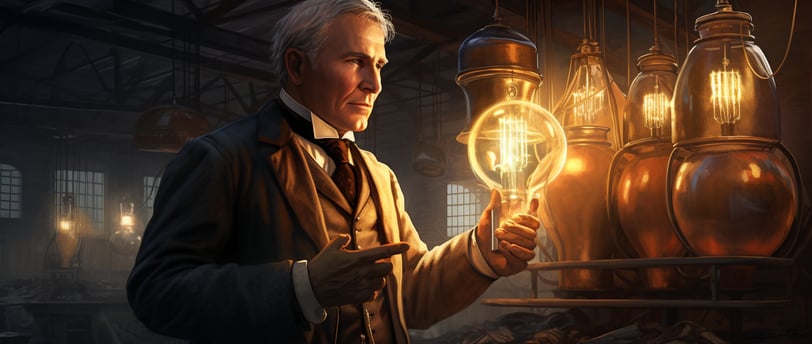Mastering Business with Edison's Strategy: A Blueprint for Success
"Dive into Thomas Edison's lesser-known prowess in business and management, beyond his famed inventiveness. Explore how Edison's persistence, team-building, innovation systems, strategic improvements, market understanding, and intellectual property protection powered his success. Learn from Edison's approach and realize that sometimes, true genius lies not in creating something new, but refining and adapting until you find the perfect fit."
8/8/20233 min read


Introduction
Thomas Alva Edison, frequently celebrated as one of the world's greatest inventors, is often less acknowledged for his acumen in business and management. Many might not know that he didn't create the light bulb from scratch; rather, he significantly improved an existing concept until he found the perfect filament. His genius, therefore, is not merely confined to his inventiveness but extends considerably to his systematic experimentation and commercial aptitude. This blog post will provide a more comprehensive examination of Edison's distinct approach to business and the lessons we can extract from his strategies.
1. Embracing the Power of Persistence
- Edison's Example: Edison's tireless search for the perfect light bulb filament involved innumerable trials of various metal alloys. His unwavering persistence eventually led him to a filament that was both enduring and efficient.
- Lesson: Persistence is often the key to overcoming challenges and achieving success in business. It requires patience, resilience, and the belief that repeated efforts will lead to the desired results.
2. Building a Team and Delegating Tasks
- Edison's Example: Edison didn't work in isolation. He understood the value of collaboration and amassed a team of talented individuals, delegating various tasks based on their strengths and expertise.
- Lesson: A successful business is rarely a one-person show. It requires a strong team and effective delegation. By leveraging the diverse skills and perspectives within a team, a business can drive innovation and achieve shared goals more efficiently.
3. Creating a System of Innovation
- Edison's Example: Edison established a system and work environment that nurtured continuous innovation. His Menlo Park laboratory was designed as an "invention factory," where a team of researchers worked on multiple projects simultaneously.
- Lesson: Business success in today's competitive landscape requires constant innovation. By creating systems and processes that foster creativity and encourage novel ideas, businesses can stay ahead of the curve.
4. Leveraging Existing Technologies
- Edison's Example: Edison excelled at taking existing concepts and refining them. He enhanced the light bulb's design, resulting in a superior, commercially viable product that changed the world.
- Lesson: Business success doesn't always hinge on creating something entirely new. Often, it involves improving upon what already exists. By refining existing technologies or systems, businesses can provide enhanced solutions that meet customers' needs more effectively.
5. Understanding Market Needs
- Edison's Example: Edison didn't invent in a vacuum. He focused on making the light bulb more practical and affordable, meeting a clear market need for better and cheaper lighting options.
- Lesson: A deep understanding of market needs and customer preferences is crucial in any business. Businesses that can anticipate and respond to these needs have a better chance of creating successful products or services.
6. Protecting Intellectual Property
- Edison's Example: Edison recognized the importance of protecting his inventions through patents. Throughout his life, he secured over 1,000 patents, shielding his inventions from competitors and creating a significant business advantage.
- Lesson: Intellectual property is a valuable business asset. By safeguarding it through patents, copyrights, or trademarks, businesses can secure their innovations and maintain a competitive edge.
7. Commercialization and Marketing
- Edison's Example: Edison knew the significance of turning an invention into a commercially viable product. He also understood the power of marketing and used dramatic demonstrations to generate interest and create demand for his inventions.
- Lesson: Innovation alone is not enough. Successful businesses understand the importance of commercializing their products and marketing them effectively to reach their target audience and drive sales.
Conclusion
Thomas Edison's approach to business was underpinned by persistence, effective delegation, systematic innovation, strategic improvement, market understanding, and intellectual property protection. His unique methodology exemplifies that success in business often requires more than mere inventiveness.
Whether you're an aspiring entrepreneur about to venture into the business world or an established leader seeking to adopt new strategies, the principles behind Edison's success offer timeless and invaluable insights. After all, like Edison, achieving success may not always require creating something entirely new. Sometimes, it's about refining, adapting, and persistently pursuing the perfect fit.
